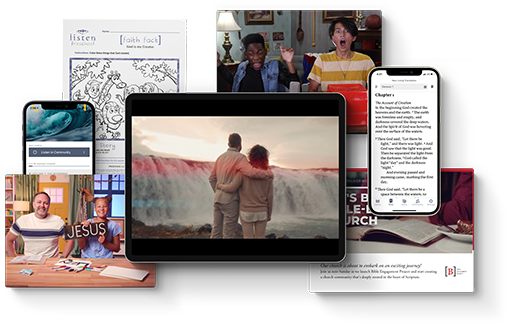Women in the Presbytery
By Kristi Northup | Posted In Personal Stories
In a growing number of districts and ministry networks, women are being added to the presbytery. Some are through appointment; others are elected. Some represent geographical sections; others represent specific groups. It’s not that there have never been female presbyters in the Assemblies of God, but I believe it is now happening with greater intentionality.
One of the first women elected as a presbyter in the Minnesota District is Elizabeth Farina. At the age of 37, Farina was elected by her peers in the East Twin Cities Section. A terrific pastor and speaker, she has some the most dynamic, well-attended sectional meetings.
Farina serves on the finance committee and helped author a resolution ensuring women, leaders under 40 years of age, and people of color are represented on the presbytery in Minnesota. She is valued by her fellow ministers as a leader, a thinker and a problem solver. Farina is also valued by me, because she is my sister.
For us, the conversation never stops about women in ministry. How do we navigate meetings where we are the only woman in the room? How has our mom done it with such a can-do attitude?
We consult each other on every aspect of life and ministry. For this interview, we sat down specifically to talk about Farina's journey and observations as she has served on the presbytery the past three years.
KRISTI NORTHUP: Tell us your story.
ELIZABETH FARINA: For 15 years, I have pastored alongside my husband, Tory, as co-lead pastor. I participated in the district, but sometimes I wondered if there could ever be a place for me in leadership.
One day we were headed to a sectional meeting when the presbyter at that time called me. Our superintendent, Mark Dean, had challenged the presbytery to think about seeing that team become more diverse. Sitting in that meeting, the presbyter felt the Holy Spirit show him I was supposed to be in that room.
He asked me, “Would you be willing to let your name stand?”
“Of course!” I answered.
He nominated me and opened the door for others to consider me for leadership. I was elected that day.
How did that change the way you thought about women in ministry in the AG?
The common sentiment of many women is that they are not welcome in higher-level leadership. What I have experienced on the presbytery is an incredible amount of respect from my fellow male leaders.
I actually believe the AG’s stance on women in ministry, and I give my colleagues the credit that they believe it, too. They have not treated me with kid gloves, but have given me an equal seat at the table.
If that’s the case, why don’t we have more women in higher-level leadership?
As Assemblies of God people, our response to women in the presbytery may be, “Of course!” Our theological position has always been that women are able to receive the call of God to perform any role, hold any title or position. They may be pastors, teachers, presbyters, and superintendents, and hold nationally elected positions.
“Let’s not leave out 50% of the church,
but let’s equip each
one who is called to bring in the harvest.”
— Elizabeth Farina
However, historically speaking, very few women have held elected positions.
With the best of intentions, women are often limited in the natural opportunities afforded to men. Women don’t travel together on fishing trips with their male pastor. They don’t jump in the car to accompany him to a committee meeting, or unpack strategy over dinner.
Consequently, as they develop, women often lack the network, the years of practiced competency, and the doors of opportunity. We need to evaluate our criteria for higher levels of leadership and ask ourselves, How can we widen the criteria and empower people to be qualified to serve in leadership?
How can men help women in the leadership journey?
I was fortunate to be mentored by my father, who had been a pastor, a district official, and a missionary. I also always had my ear to the door for people who mentored my husband. Even though they weren’t directly mentoring me, I was like Ruth; I gleaned.
It’s a huge boost when men in leadership figure out a way to mentor women. We realize it can’t be done the same way, but it can still happen. Sometimes it’s challenging a female kids’ pastor to preach on a Sunday morning, or inviting a female assistant to a meeting and debriefing afterward in the office. It can be done with integrity.
It’s also opening doors. My presbyter opened the door for me. One of the executive presbyters requested I be on the finance committee. If male leaders will think outside the regular list of go-to people they know and think of women, younger leaders, and people of color, it can be life changing. It may take effort, but it brings such a richness of perspective to the table.
What responsibility do women have?
Sometimes women hold themselves back. They’re just grateful to be there, but we don’t need another token. I’m not an observer; I’m an active participant. We need women leaders who will work, lead and be a great team player. I’m often the only woman in the room, but that’s only as awkward as I make it.
Over the years, I’ve served side-by-side with a great group of guys, and we’ve developed working relationships based on mutual respect. I try to come prepared and bring my best. When they kick the ball to me, I try to be ready to win one for the team.
My role is not to represent women, but to represent my section. The best way I can represent women in ministry is not to always talk about women in ministry, but to represent as a ministry person. I’m privileged to work on issues about the camp, the credentialling process, and the finance committee.
When I’ve actually been sitting in the room at the right moment, I’ve been able to advocate to put women into more visible roles. It’s not that they didn’t want women in those roles, but they just didn’t have the same relationship network. Once I was in the room, I could recommend competent women.
Final thoughts?
Being on the presbytery has been such a growing experience for me. I have gotten a heart for other churches that operate differently. I wish everyone had the opportunity to take the next step. It has made me a better leader and minister. It has helped me learn to strategize. It’s a growing opportunity we should invite more people into.
For 95 years, Minnesota had never had a female presbyter. This year, on [our] 100th anniversary, we will have three. It didn’t just happen; it’s been intentionality on the part of the leadership.
When we model it at the top, it brings awareness to the benefit. We already believe women are called to ministry. We can open up opportunities to empower women in our churches to see there is a place for them. We can display the belief we already hold.
When we have women in the presbytery, it filters down to church boards, committees, and district officials. Let’s not leave out 50% of the church, but let’s equip each one who is called to bring in the harvest.


